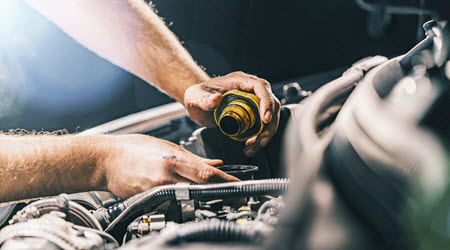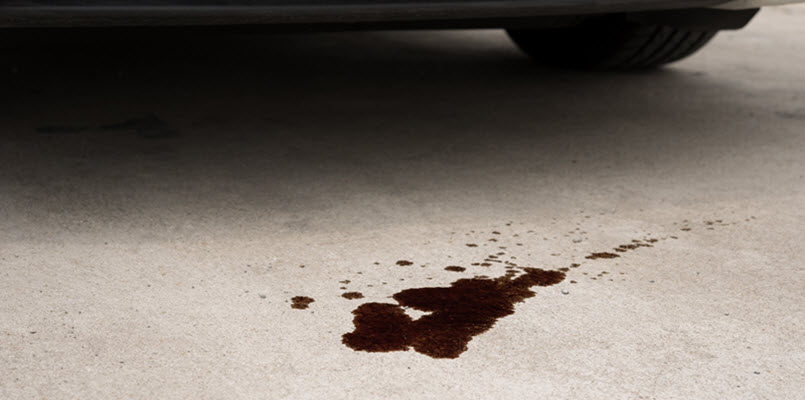Porsches are among the most well-known sports cars throughout the world. While they have a good overall reputation, they are not excluded from experiencing issues just like any other automobile. Among the most common problems, a Porsche driver can have is an oil leak. These oil leaks can just be a minor inconvenience while other leaks can be a warning sign that there are more serious problems occurring in your vehicle. We discuss how you can spot leaks in this article while offering tips for how to effectively handle them.
Symptoms and Causes of an Oil Leak
There can be clear indications that your Porsche is leaking oil. You can obviously have a puddle underneath the car, but there are more subtle signs such as the following:
- A strong odor of burning oil
- A significant drop in oil levels (by using a dipstick)
- Rattling engine noises
Leaks are commonly found dripping from the oil pan gasket as well as the front seals, valve cover seals, or the rear main seal of the vehicle. The rear main seal can be one of the more costly causes because of how deep it is inside the engine. Other possible causes can be faulty engine thermostat o-rings, oil return tube seals, crankshaft oil seals, and lower valve gasket covers. Gaskets are a comparatively easy fix while seals more time-consuming and expensive.
Effects of an Oil Leak
It is unwise to dismiss an oil leak. The purpose of oil is to lubricate the engine of your Porsche. Without it, your engine can seize and be severely damaged. If oil leaks, it can also damage engine belts, hoses, ignition parts, and electrical sensors. If oil seeps into your brake system, it can result in a great amount of damage.
Leaking oil also poses a fire hazard risk. It can ignite if it gets hot enough and leaks onto the exhaust system. For instance, since a catalytic converter reaches up to 800 degrees in temperature, a fire can easily result if the oil reaches it.
Another effect of leaking oil is costs to you. Among the main reasons that replacing a rear main seal is so expensive is because there is a great deal of labor involved. Before you can reach the seal, it is necessary to remove your Porsche’s back bumper, transmission, flywheel, and exhaust system. Also, this repair cannot be postponed or avoided since your vehicle cannot run without the presence of oil.
Dealing with an Oil Leak
Regularly scheduled maintenance for your Porsche will keep issues to a minimum, and regularly replacing the seal can be among the best preventative options to avoiding leaks. Living in an area with the commonplace stop-and-go traffic makes it necessary for you to change your oil frequently. The clean oil can prevent the forming of sludge from forming which can lead to unnecessary engine strain and engine seal wear and tear.
Among the most common temporary solution is to simply add extra oil to the engine if it is running low. While this usually works well for slow leaks and needs to be done frequently to ensure the levels never get too low, this is not an optimum long-term fix since you not getting to the root of the problem. Replacing damaged or worn car parts can be too expensive which causes many people to instead choose products that only stop the leaks. In general, these products are very ineffective. They use various chemicals that cause swelling in the seals to make it less likely to leak oil. This is only a cosmetic and temporary fix that can mask a much larger issue. That issue can cause your engine to seep oil in different areas, leading to higher costs over a prolonged period of time.
Let Us Help
Your best bet for avoiding dangerous leaks is to be on  the lookout for abnormal problems in your Porsche to address them sooner rather than later. Mark Douglas Motorworks has several years of experience serving customers in the Orange County area, including Mission Viejo, Lake Forest, Costa Mesa, Irvine, Huntington Beach, Laguna Hills, and Laguna Nigel, CA. We want to continue offering our expertise, so please contact Mark Douglas Motorworks to have your Porsche serviced by experts.
the lookout for abnormal problems in your Porsche to address them sooner rather than later. Mark Douglas Motorworks has several years of experience serving customers in the Orange County area, including Mission Viejo, Lake Forest, Costa Mesa, Irvine, Huntington Beach, Laguna Hills, and Laguna Nigel, CA. We want to continue offering our expertise, so please contact Mark Douglas Motorworks to have your Porsche serviced by experts.

